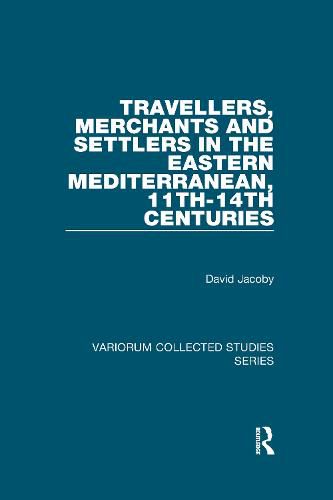Readings Newsletter
Become a Readings Member to make your shopping experience even easier.
Sign in or sign up for free!
You’re not far away from qualifying for FREE standard shipping within Australia
You’ve qualified for FREE standard shipping within Australia
The cart is loading…






This collection of studies (the eighth by David Jacoby) covers a period witnessing intensive geographic mobility across the Mediterranean, illustrated by a growing number of Westerners engaging in pilgrimage, crusade, trading and shipping, or else driven by sheer curiosity. This movement also generated western settlement in the eastern Mediterranean region. A complex encounter of Westerners with eastern Christians and the Muslim world occurred in crusader Acre, the focus of two papers; a major emporium, it was also the scene of fierce rivalry between the Italian maritime powers. The fall of the crusader states in 1291 put an end to western mobility in the Levant and required a restructuring of trade in the region. The next five studies show how economic incentives promoted western settlement in the Byzantine provinces conquered by western forces during the Fourth Crusade and soon after. Venice fulfilled a major function in Latin Constantinople from 1204 to 1261. The city’s progressive economic recovery in that period paved the way for its role as transit station furthering western trade and colonization in the Black Sea region. Venice had also a major impact on demographic and economic developments in Euboea, located along the maritime route connecting Italy to Constantinople. On the other hand, military factors drove an army of western mercenaries to establish in central Greece a Catalan state, which survived from 1311 to the 1380s.
$9.00 standard shipping within Australia
FREE standard shipping within Australia for orders over $100.00
Express & International shipping calculated at checkout
This collection of studies (the eighth by David Jacoby) covers a period witnessing intensive geographic mobility across the Mediterranean, illustrated by a growing number of Westerners engaging in pilgrimage, crusade, trading and shipping, or else driven by sheer curiosity. This movement also generated western settlement in the eastern Mediterranean region. A complex encounter of Westerners with eastern Christians and the Muslim world occurred in crusader Acre, the focus of two papers; a major emporium, it was also the scene of fierce rivalry between the Italian maritime powers. The fall of the crusader states in 1291 put an end to western mobility in the Levant and required a restructuring of trade in the region. The next five studies show how economic incentives promoted western settlement in the Byzantine provinces conquered by western forces during the Fourth Crusade and soon after. Venice fulfilled a major function in Latin Constantinople from 1204 to 1261. The city’s progressive economic recovery in that period paved the way for its role as transit station furthering western trade and colonization in the Black Sea region. Venice had also a major impact on demographic and economic developments in Euboea, located along the maritime route connecting Italy to Constantinople. On the other hand, military factors drove an army of western mercenaries to establish in central Greece a Catalan state, which survived from 1311 to the 1380s.